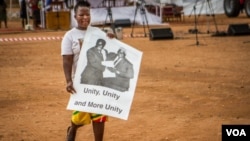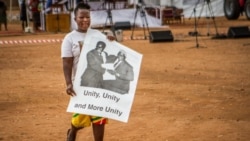Zimbabwe on Tuesday marked the 1987 Unity Accord signed by Zanu PF and PF Zapu with the ruling party saying the agreement brought peace in the nation.
But opposition parties say the peace treaty has not benefited all Zimbabweans.
On this day 28 years ago, Zanu PF leader and then Zimbabwean Prime Minister, Robert Mugabe, and PF Zapu leader, Joshua Nkomo, signed a unity pact following internal disturbances that allegedly claimed more than 20,000 lives in Matabeleland and Midlands provinces.
From that day, December 22, is a national holiday to celebrate the coming together of the two liberation parties, which many say brought peace and tranquility in the country.
Zanu PF member and Information and Communication Technology Minister, Supa Mandiwanzira, says unlike other African nations torn by civil wars, Zimbabwe is enjoys a lot of peace due to the Unity Accord.
Mandiwanzira says, “As a result of the peace that was struck by his excellency the President, and the late Dr. Joshua Nkomo, we are a united and peaceful nation, and you can never put a monetary value to the peace that we enjoy in this country.”
Mandiwanzira, who was still in secondary school when the unity pact was signed, says he is proud to be a beneficiary of the agreement.
“Only if you are united you can achieve a lot more. I am very proud, today I am a minister, I am very grateful for this opportunity that was born out of this struggle and sacrifices of many.”
UNITY ACCORD PREVENTED POLITICAL ANARCHY
Former liberation war fighter and Zanu PF lawmaker, Joseph Chinotimba, says the unity accord is very important to this day as it has prevented the country from sliding into chaos like what is happening in other African countries.
He says what’s obtaining in countries like, Libya, Syria and Iraq clearly demonstrates why unity must prevail in a nation.
“That unity must remain as it is. We are enjoying it. There is no war. If you look at South Africa, they are shouting at each other, but Zimbabwe is quiet. Were it not for people like you at Studio 7 – you don’t report truth, this country is peaceful…”
But not all Zimbabweans feel the same. Most opposition political parties in the country feel the Unity Day has lost its importance as the ruling Zanu PF party now uses the occasion to denigrate them.
In statement to mark Unity Day, Marcellina Chikasha of the African Democratic Party speaking on behalf of 13 opposition political parties which include the MDC formation of former Prime Minister, Morgan Tsvangirai, said the unity accord has lost its meaning due to Zanu PF’s intolerance of the opposition.
She said Zanu PF itself is no longer united. “This party is divided into three factions, and they are embroiled in a succession conundrum. Secondly, the original unity accord with PF Zapu has collapsed. Third, no unity and reconciliation has been attempted with other political parties.”
GUKURAHUNDI ATROCITIES
Student activist, Gift Ostallos Siziba, says there cannot be real peace and unity in Zimbabwe without telling the truth about what happened during the Gukurahundi atrocities.
“The people who are perpetrators of the butchering, the genocide in Matabeleland are still free, moving around and continue with the butchering of the ordinary people of Zimbabwe. And therefore, we cannot say that there is any peace to celebrate in this country because everyday people disappear, everyday people are butchered, people are incarcerated by the regime of Robert Mugabe.”
Others say the unity accord is not inclusive, noting that one of its main objectives was to create a one party state and this could not be allowed to happen as Zimbabwe has many political parties.
But despite all these concerns, political commentator, Ernest Mudzengi of the Media Center says the unity accord is still relevant to the Zanu PF politics.
“When you look at PF Zapu and Zanu-PF, those were the foremost liberation movements in this country. So when we look at our history it is important in that it marks a certain point in the unfolding history of Zimbabwe.”
ZANU PF VICE PRESIDENT
Zanu PF respects and recognizes the unity accord, which among other issues, stipulates that the party or government’s two deputies should come from the two signatories of the agreement.
Nkomo, who died 12 years after signing the pack, has been succeeded by the late Vice President Joseph Msika, the late Vice President John Nkomo and the current Vice President Phelekezela Mphoko, while Mr. Mugabe has stayed as first secretary and president of the party and country since 1987.
















